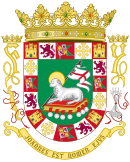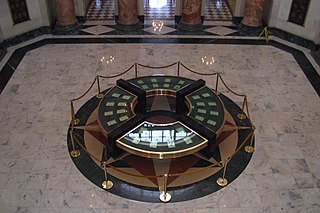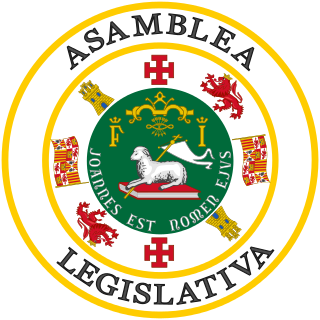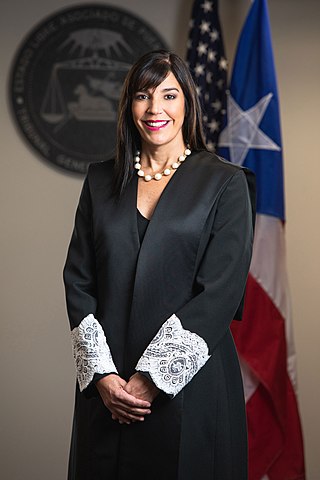 |
|---|
The legal system of Puerto Rico is a mix of the civil law and the common law systems. [1]
 |
|---|
The legal system of Puerto Rico is a mix of the civil law and the common law systems. [1]
Puerto Rico is the only current U.S. jurisdiction whose legal system operates primarily in a language other than American English: namely, Spanish. Because the U.S. federal government operates primarily in English, Puerto Rican attorneys are typically bilingual in order to litigate in English in U.S. federal courts and to litigate federal preemption issues in Puerto Rican courts.[ citation needed ]
Title 48 of the United States Code outlines the role of the United States Code to United States territories and insular areas such as Puerto Rico.
Many of the Laws of Puerto Rico (Leyes de Puerto Rico) are modeled after the Spanish Civil Code, which is part of the Law of Spain. [2] After the U.S. government assumed control of Puerto Rico in 1901, it initiated legal reforms resulting in the adoption of codes of criminal law, criminal procedure, and civil procedure modeled after those then in effect in California. Although Puerto Rico has since followed the federal example of transferring criminal and civil procedure from statutory law to rules promulgated by the judiciary, several portions of its criminal law still reflect the influence of the California Penal Code.
The judicial branch is headed by the Chief Justice of the Puerto Rico Supreme Court, which is the only appellate court required by the Constitution. All other courts are created by the Legislative Assembly of Puerto Rico.
As Puerto Rico is under United States sovereignty, U.S. federal law applies in the territory, and cases of a federal nature are heard in the United States District Court for the District of Puerto Rico.

Puerto Rico, officially the Commonwealth of Puerto Rico, is a Caribbean island and unincorporated territory of the United States with official Commonwealth status. It is located in the northeast Caribbean Sea, approximately 1,000 miles (1,600 km) southeast of Miami, Florida, between the Dominican Republic and the U.S. Virgin Islands, and includes the eponymous main island and several smaller islands, such as Mona, Culebra, and Vieques. It has roughly 3.2 million residents, and its capital and most populous city is San Juan. Spanish and English are the official languages of the executive branch of government, though Spanish predominates.

The Foraker Act, Pub. L. 56–191, 31 Stat. 77, enacted April 12, 1900, officially known as the Organic Act of 1900, is a United States federal law that established civilian government on the island of Puerto Rico, which had recently become a colony of the United States as a result of the Spanish–American War. Section VII of the Foraker Act also established Puerto Rican citizenship. President William McKinley signed the act on April 12, 1900 and it became known as the Foraker Act after its sponsor, Ohio Senator Joseph B. Foraker. Its main author has been identified as Secretary of War Elihu Root.

The federal government of the United States is the national government of the United States, a federal republic located primarily in North America, composed of 50 states, five major self-governing territories, several island possessions, and the federal district and national capital of Washington, D.C., where most of the federal government is based.

The Constitution of the Commonwealth of Puerto Rico is the controlling government document of Puerto Rico. It is composed of nine articles detailing the structure of the government as well as the function of several of its institutions. The document also contains an extensive and specific bill of rights. It was ratified by Puerto Rico's electorate in a referendum on March 3, 1952, and on July 25, 1952, Governor Luis Muñoz Marín proclaimed that the constitution was in effect. July 25 is known as Constitution Day.
The Insular Cases are a series of opinions by the Supreme Court of the United States in 1901 about the status of U.S. territories acquired in the Spanish–American War. Some scholars also include cases regarding territorial status decided up until 1914, and others include related cases as late as 1979. The term "insular" signifies that the territories were islands administered by the War Department's Bureau of Insular Affairs. Today, the categorizations and implications put forth by the Insular Cases still govern the United States' territories.
In the United States, state law refers to the law of each separate U.S. state.

The Legislative Assembly of Puerto Rico is the territorial legislature of the Commonwealth of Puerto Rico, responsible for the legislative branch of the government of Puerto Rico. The Assembly is a bicameral legislature consisting of an upper house, the Senate normally composed of 27 senators, and the lower house, the House of Representatives normally consisting of 51 representatives. Eleven members of each house are elected at-large rather than from a specific legislative district with all members being elected for a four-year term without term limits.

The Supreme Court of Puerto Rico is the highest court of Puerto Rico, having judicial authority to interpret and decide questions of Puerto Rican law. The Court is analogous to one of the state supreme courts of the states of the United States and is the highest state court and the court of last resort in Puerto Rico. Article V of the Constitution of Puerto Rico vests the judicial power in the Supreme Court, which by nature forms the judicial branch of the government of Puerto Rico. The Supreme Court holds its sessions in San Juan.

The Jones–Shafroth Act —also known as the Jones Act of Puerto Rico, Jones Law of Puerto Rico, or as the Puerto Rican Federal Relations Act of 1917— was an Act of the United States Congress, signed by President Woodrow Wilson on March 2, 1917. The act superseded the Foraker Act and granted U.S. citizenship to anyone born in Puerto Rico on or after April 11, 1899. It also created the Senate of Puerto Rico, established a bill of rights, and authorized the election of a Resident Commissioner to a four-year term. The act also exempted Puerto Rican bonds from federal, state, and local taxes regardless of where the bondholder resides.

Federico Degetau y González was a Puerto Rican politician, lawyer, writer, author, and the first Resident Commissioner of Puerto Rico to the United States House of Representatives.
Balzac v. Porto Rico, 258 U.S. 298 (1922), was a case in which the Supreme Court of the United States held that certain provisions of the U.S. Constitution did not apply to territories not incorporated into the union. It originated when Jesús M. Balzac was prosecuted for criminal libel in a district court of Puerto Rico. Balzac declared that his rights had been violated under the Sixth Amendment to the U.S. Constitution as he was denied a trial by jury since the code of criminal procedure of Puerto Rico did not grant a jury trial in misdemeanor cases. In the appeal, the U.S. Supreme Court affirmed the judgments of the lower courts on the island in deciding that the provisions of the Constitution did not apply to a territory that belonged to the United States but was not incorporated into the Union. It has become known as one of the "Insular Cases".

Law in the state of Louisiana is based on a more diverse set of sources than the laws of the other 49 states of the United States. Private law—that is, substantive law between private sector parties, principally contracts and torts—has a civil law character, based on French and Spanish codes and ultimately Roman law, with some common law influences. Louisiana's criminal law largely rests on American common law. Louisiana's administrative law is generally similar to the administrative law of the federal government and other states. Louisiana's procedural law is generally in line with that of other U.S. states, which in turn is generally based on the U.S. Federal Rules of Civil Procedure.

The California Codes are 29 legal codes enacted by the California State Legislature, which together form the general statutory law of California. The official Codes are maintained by the California Office of Legislative Counsel for the Legislature. The Legislative Counsel also publishes the official text of the Codes publicly at leginfo.legislature.ca.gov.

The law of California consists of several levels, including constitutional, statutory, and regulatory law, as well as case law. The California Codes form the general statutory law, and most state agency regulations are available in the California Code of Regulations.

Lesbian, gay, bisexual, transgender (LGBT) persons in Puerto Rico have almost the same protections and rights as heterosexual individuals. Public discussion and debate about sexual orientation and gender identity issues has increased, and some legal changes have been made. Supporters and opponents of legislation protecting the rights of LGBT persons can be found in both of the major political parties. Public opposition still exists due, in large part, to the strong influence of the Roman Catholic Church, as well as socially conservative Protestants. Puerto Rico has a great influence on the legal rights of LGBT citizens. Same-sex marriage has been legal in the commonwealth since July 2015, after the U.S. Supreme Court ruled in the case of Obergefell v. Hodges that same-sex marriage bans are unconstitutional.

In the United States, a state is a constituent political entity, of which there are 50. Bound together in a political union, each state holds governmental jurisdiction over a separate and defined geographic territory where it shares its sovereignty with the federal government. Due to this shared sovereignty, Americans are citizens both of the federal republic and of the state in which they reside. State citizenship and residency are flexible, and no government approval is required to move between states, except for persons restricted by certain types of court orders.
Puerto Rico is an island in the Caribbean region in which inhabitants were Spanish nationals from 1508 until the Spanish–American War in 1898, from which point they derived their nationality from United States law. Nationality is the legal means in which inhabitants acquire formal membership in a nation without regard to its governance type. In addition to being United States nationals, people born in Puerto Rico are both citizens of the United States and citizens of the Commonwealth of Puerto Rico. Citizenship is the relationship between the government and the governed, the rights and obligations that each owes the other, once one has become a member of a nation. Though the Constitution of the United States recognizes both national and state citizenship as a means of accessing rights, Puerto Rico's history as a territory has created both confusion over the status of its nationals and citizens and controversy because of distinctions between jurisdictions of the United States. These differences have created what political scientist Charles R. Venator-Santiago has called "separate and unequal" statuses.
The law of Mexico is based upon the Constitution of Mexico and follows the civil law tradition.
The law of Peru includes a constitution and legislation. The law of Perú is part of the Roman-Germanic tradition that concedes the utmost importance to the written law, therefore, statutes known as leyes are the primary source of the law.

Gina Raquel Méndez-Miró is a Puerto Rican jurist serving as a United States district judge of the United States District Court for the District of Puerto Rico. She previously served as appellate judge of the Puerto Rico Court of Appeals.
Court decisions freely available to the public online, in a consistent format, digitized from the collection of the Harvard Law Library